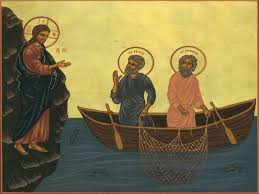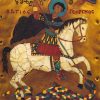But I say to you, Love your
enemies and pray for those
who persecute you.
– Jesus Christ (Mat 5:44)

 Passenger planes taken by terrorists fly into the two towers of the World Trade Center; the buildings collapse and thousands are killed. Many more are wounded. Still more now suffer from having breathed in the toxic airbourne debris.
Passenger planes taken by terrorists fly into the two towers of the World Trade Center; the buildings collapse and thousands are killed. Many more are wounded. Still more now suffer from having breathed in the toxic airbourne debris.
During the Second World War, entire cities – London, Manchester, Birmingham, Dresden, Hamburg, Berlin, Tokyo, Hiroshima, Nagasaki -become targets of war. Everyone without exception was a target – children, the ill, grandparents, ordinary people. They died in countless thousands.
In the Soviet era, millions were taken away, some to labor camps in which it was a miracle not to die of disease, exposure, abuse, or execution. I recall visiting a place of mass executions in a Belorussian forest. Here, during the Stalin years, people were brought by the truck-load each day and one by one were shot in the back of the head and thrown into deep pits. When one pit was filled, another was dug. There were many pits.
We still aren’t sure how many millions were killed under the Hitler regime- Jews, gypsies, political dissidents, homosexuals, Christians who dared to resist or people simply regarded as inconvenient. As in the Soviet gulag, many died simply of the consequences of living in such condition and being worked like slaves. A vast number were simply executed. The murders were done not only in concentration camps but also in hospitals. In the latter, people regarded as genetically or mentally inferior were killed. It was regarded as “mercy killing.”
In Communist Albania it became a criminal activity to make the sign of the cross, to have an icon in one’s home or to dye an egg red at Easter. Every church, monastery and seminary without exception was closed. The smallest indication of religious belief could be severely punished. Most priests and many lay people died in concentration camps.
One could spend many hours briefly describing, country by country, the horrors of mass violence that human beings have suffered just in the past hundred years. I mention a few examples only to point out that, when we talk about Christ’s commandment to love one’s enemies, the beginning point is the recognition that we have enemies and that evil deeds occur every minute of the day. Often times nationalistic, racial or ideologically-driven movements develop in such a way that enormous numbers of people find themselves in grave danger.

There are people who, having lost any sense of the sacredness of life, abuse and murder innocent people, even children – some on a large scale, others as a kind of hellish past-time. I think of my stepmother, Carla, who was shot and killed by sniper as she stepped off the bus one evening in San Francisco in 1966 after a day of service in a center for alcoholics.
Such events were once rare; in more recent years they have become more common. Most of us have stories to tell of awful things that happened – grave danger, abuse, or violence- to ourselves or to people we know. I am equally sure that many of us have memories of dreadful things we have done or said to others, under obedience, out of fear, or in a state of rage.
The reality of enmity is a cental theme in the Gospels. The peaceful, star-illumined Bethlehem we see in Christmas cards tells us nothing at all about the hard life the people lived there were enduring when Jesus was born. The years of Christ’s life described in the Gospels occurred in a small land under heavy, often brutal, military occupation. There was no concept of human
rights. Torture and crucifixion were not rare punishments. It’s no wonder that there was a serious movement of Jewish armed resistance, the Zealots, and that conflict between Israel and Rome not many years later resulted in the destruction of Jerusalem and the enslavement of thousands of Jews.
So when Jesus instructed his followers, as he did in his Sermon on the Mount, to love their enemies and pray for them, it was not a teaching that would have been offered in a state of naivete by someone living in an oasis of peace, nor was it a teaching that would have been easily embraced by the suffering people who were listening to him. It’s not a teaching anyone, even in situations of relative social tranquility, takes to easily. What most of us do when we are abused by others is look for a way to return the abuse, even doing so in double measure. Say an irritating word to me and I’ll give you irritation back, multiplied by two. Hit me and I’ll hit you twice as hard. Few Jews had a kind thought regarding the uninvited Romans. Occupation troops are resented and despised. They often become the targets of deadly violence.
We see this even in cases where an occupation is meant to be humanitarian. Jesus is never just a man of words. Can you think of anything he taught that he didn’t give witness to in the way he lived and interacted with other people? I cannot.
He urged his followers to be peacemakers. In the Beatitudes, he says they will be known as God’s own children. In his own life, again and again we see both courage and nonviolence. He repeatedly gave the witness of refusing to return evil for evil. His most violent action was to use a whip of chords to chase money-lenders from the Temple because they were profaning sacred space. Many were upset, but no one was harmed. The only life endangered by his action was his own. The total number of people killed by Jesus Christ is zero.
While many people are driven by anger and vengeance, Christ taught forgiveness and again and again gave the example of forgiving others. When asked by his disciples if they must forgive as much as seven times, Christ replied: seventy times seven. Forgiveness is one of the main themes of the Lord’s Prayer, in which we ask God to forgive us only insofar as we have forgiven others. Perhaps nothing is more impressive than seeing Christ praying for his enemies as he hung nailed to the cross: “Father, forgive them, they don’t know what they are doing.” Indeed, it seems that none of those involved in crucifying him had any idea what they were doing. The idea that Jesus was king of the Jews and son of God was nothing more than a joke. For some, a heretic was being punished. For others, he was a threat to the Jewish people. For the Roman soldiers, it was simply a grim duty they were under orders to perform.
Jesus also gave the witness of healing. Healing is another word for peacemaking. Peacemaking is the healing of damaged or broken relationships. On one occasion an act of healing was done in response to an appeal not from a fellow Jew, but from an officer of the Roman occupation forces, the centurion who appealed to Jesus on behalf of a critically ill servant. Jesus was prepared to come to the soldier’s home, but the officer said there was no need for that; Jesus’s word was all he needed. Jesus later said that he hadn’t seen such faith in all of Israel. Can you imagine how annoyed, even scandalized, some of the witnesses to this exchange would have been? A good deed for a Roman? Admiration for a Roman’s faith?
If you take Jesus’s teaching about love of enemies out of the Gospel, you have removed the keel from the ship. But then how do we go about loving an enemy? The answer is given to us by Christ. He doesn’t simply command us to love our enemies, but to pray for them.
Without praying for our enemies, how would it be possible to love them? Think about these two important words, love and prayer. The love so often spoken of by Christ is not romantic love. Love is not about how we feel regarding the other but how we respond to the other. If you say you love someone, but you let him starve to death when it is in your power to give him food, in fact you do not love him. love. If you say you love God, but you abandon your neighbor, you love neither God nor neighbor.
Love is not the acquisition of pleasant feelings for an enemy, the kind of feeling we have for a sweetheart, a member of your family, or a cherished friend. The love Christ speaks of has very little to do with feelings and much to do with actions. Love is to do what you can to preserve another life and to bring that person toward salvation. Christ uses a metaphor: God’s love is like the rain falling equally on both wheat and weeds; or it is like the sun shining on both the just and the unjust. This doesn’t mean God doesn’t distinguish between the just and the unjust; but so long as a person lives, the possibility of repentance and conversion lives.
Think about the word prayer. Prayer is the giant step of taking into your heart, the center of your life, your appeal to God for the well-being and healing of another person’s life. It is not a sentimental action but an act of will and an obedience to God, knowing that God seeks the well-being and salvation of each person. After all, each person, no matter how misguided or damaged, is nonetheless a bearer of the image of God. If it pains you to imagine the intentional destruction of an icon, how much more distress should we feel when an human being is harmed or killed?
I’m talking now about the Gospel according to Matthew, Mark, Luke and John – not the Gospel according to Hollywood. The latter provides us with a never-ending parade of stories about evil people killed by good people. The basic story tempts us to prefer heroism to sanctity, or to confuse the two. A basic element of the Gospel According to Hollywood is that the evil people are so evil that there is no real solution short of hastening their death.
Confronted by such pure evil, what else can one do? But the teaching of Christ is not to kill enemies but to overcome enmity. It’s like the transformation of water into wine that Christ performed at the wedding feast in Cana. We are commanded to convert our enmity into love, and it starts with prayer.
But to pray for an enemy is no small or easy step. The fact is that the last people in the world we want to pray for are the people we fear or hate or regard with disgust. You know you have an enemy whenever you discover a person or community of people for whom you hesitate to pray. But once you recognize enmity, take note of it. Keep a list of the people you find it hard to pray for and then pray for them anyway. Do it as a religious duty.
Prayer is an invisible binding together. The moment I pray for another person, a thread of connection is created. I have taken that person into myself. Praying for him means to ask God to bless him, to give him health, to lead him toward heaven, to use me to help bring about his salvation. As soon as this occurs, my relations with that person or community of people is changed.
You look differently at a person you are praying for. You listen differently. It doesn’t mean you will necessarily agree. You may disagree more than ever. But you struggle more to understand what is really at issue and to find solutions that will be for his good as well as your own. In fact, the saints tell us, that the deeper we go in the life of faith, the freer we become from worrying about our own welfare, and the more we worry about the welfare of others.
Some years ago, at a conference on the Greek island of Crete, I gave a talk in which I summarized Orthodox teaching about war. I pointed out that the Orthodox Church has never embraced the just war doctrine, a doctrine that evolved in the west. The Orthodox Church, I said, regards war as inevitably sinful in nature even in cases where no obvious alternative to war can be found. No one has ever been canonized for killing. Priests, deacons and iconographers are forbidden by canon law to kill or cause the death of others. Under all circumstances and at all times, every baptized person is commanded by Christ to love his enemies.
There was nothing remarkable in what I said, no novel doctrines, nothing borrowed from non-Orthodox sources, yet the lecture stirred up a controversy not only in the hall in which I was speaking but into the city itself as my talk and the translator’s words were being broadcast live over the diocesan radio station. The debate continued that night when the local bishop, Metropolitan Irinaios, and I took part in a radio conversation with listeners phoning in with their comments or questions. Responding to a man who called in to denounce Turks as barbarians who only understood the language of violence, I summarized what Christ had to say on the subject of loving one’s enemies. “That’s all very well,” the caller responded, “but now let me tell you about a real saint.” He proceeded to tell me about a priest who, in the 19th century, played a valiant role in the war to drive the Turks off the island. I suggested he not dismiss the teaching of Jesus so readily and asked if he wasn’t perhaps confusing heroism and nationalism with sanctity.
In fact we have soldier saints, like Great Martyr George. But when we study their lives in order to find out why the Church canonized them, it was never for their courage and heroism as soldiers, but for other factors. Most were martyrs – people who  died for their faith without resistance. There are saints who got in trouble for refusing to take part in war, in some cases dying for their disobedience. St. George dared to confess his faith publicly during a time of imperial persecution. The “dragon” he irritated was Caesar. One saint, Martin of Tours, narrowly escaped execution after refusing to take part in battle; he went on to become a great missionary bishop.
died for their faith without resistance. There are saints who got in trouble for refusing to take part in war, in some cases dying for their disobedience. St. George dared to confess his faith publicly during a time of imperial persecution. The “dragon” he irritated was Caesar. One saint, Martin of Tours, narrowly escaped execution after refusing to take part in battle; he went on to become a great missionary bishop.
There is Ireland’s renowned Saint Columba, who is on the Church calendar not because he was co-responsible for a great battle in which many were slaughtered, but because he went on to live a life of penance in exile, in the process converting many to Christ.
All of what I’m saying probably sounds fine. It isn’t hard to admire saints. Most people realize that the Gospel is not a summons to hatred or violence. But what about our ordinary selves living here and now? What does this have to do with how we carry on our lives? A beginning point is to admit we are only partial Christians – that is to say, our conversion has begun but is far from complete. When we go to confession, many of us don’t even try confessing all of our sins because no priest in the world would have time to hear them all. We try to identify the main ones, the sins that are most urgent and problematic, and focus on them, saving other sins for a later confession. Each of us is painfully aware that we have far to go. As the cartoon character Pogo used to say, “We have met the enemy and he is us.”
One of the great obstacles were up against is that it’s easier to be more nation-centered than Christ-centered. The culture we live in is a powerful influence. One is less likely to be shaped by the Gospel than by the particular economic, social, political and cultural milieu we happen to be part of. If I am a German living in Germany in the 1930s, there is a good chance I will gravitate toward Nazism. If I am a white South African living in the era of apartheid, it’s more than likely that I will accept the justifications for racism, and the benefits that come from being part of a racist society. Our thoughts, values, choices, our “life style” – all these tend to be formed by the mass culture in which we happen to be born and reared. If we are Christians, we will try to adjust Christ and the Gospel to the national flag and the views of the people around us.
Yet we have in the Church many saints who provide us with models of what it means to follow Christ wholeheartedly – without holding anything back, without compromising with the demands of money or politics. One such saint – canonized only two years ago – is Mother Maria Skobtsova, a Russian refugee in France who devoted herself to the care of the homeless and destitute, and also to the renewal of the Church. She and the community she was part of helped save the lives of many people, especially Jews, when France was occupied by the Third Reich. On one occasion she managed to smuggle children awaiting deportation out of a stadium in which thousands of Jews had been rounded up. It is hardly surprising that eventually she was arrested and ended her life in a German concentration camp,
Ravensbruk, dying on Good Friday. Yet we find in her many letters, essays and the acts of her brave life not a trace of hatred for Germans or Austrians, even those who were captive of Nazi ideology. She was part of the resistance to Nazism and Hitlerism, but was no one’s enemy, not even Hitler’s. Her small community produced three other martyrs: the priest who assisted her, Fr. Dimitri Klepenin, her son, Yuri, who was then just entering adulthood, and her good friend Ilya Fondaminsky, a writer, editor and publisher.
At the core of their lives and many courageous actions was the conviction, as Mother Maria put it, that “each person is the very icon of God incarnate in the world.” This is not some new idea that was discovered by a few saintly Christians in Paris in that grim time, but what C.S. Lewis referred to as “mere Christianity.” It is because each person is an icon of God that everyone in the church is honored with incense during the Liturgy.
Mother Maria had been married and become a mother before taking the monastic path. Before that happened, her husband left her and one of her children died of illness. She embraced a celibate vocation, but her understanding of monastic life was not the traditional one of withdrawal. Her desert was the city. She was opposed to living a life that might impose “even the subtlest barrier which might separate the heart from the world and its wounds.” Like any Orthodox Christian, the Liturgy was at the heart of her life, not as an end in itself but because it gave daily life a divine imprint.
“The meaning of the Liturgy must be translated into life,” she said. “It is why Christ came into the world and why he gave us our Liturgy.” She was determined to live a life in which the works of mercy were central. As she wrote: “At the Last Judgment I shall not be asked whether I was successful in my ascetic exercises, nor how many bows and prostrations I made. Instead I shall be asked, Did I feed the hungry, clothe the naked, visit the sick and the prisoners. That is all I shall be asked.” No one has lived in a more violent time than she, a time in which there were powerful temptations to keep one’s head down and quietly survive. Yet instead she and those who worked with her give us a model of centering one’s life on those whose lives are threatened.
In Europe in those days it was especially the Jews. In our time the list of those in danger is much longer, including not only the born but the unborn as well as those who are handicapped or old. We live in what many people have come to identify as a culture of death. The only question each of us must struggle with is where to focus our life-saving activity. It is not just a question of saving lives but making clear to others, through our response to them, that they bear God’s image – thus we proclaim that there is a God, and that God is love.
We have met the enemy and he is us, as Pogo said. But the self is no small foe. In the days when India was struggling for independence, Gandhi sometimes said he had only three enemies – the British nation, his favorite enemy; the Indian people, a much more difficult adversary, and finally a man named Gandhi, the hardest enemy of all. Each of us sees our most difficult enemy when we look into a mirror. Yet if we will only cooperate in Christ’s mercy, struggling day by day to die to self, day by day our conversion will continue, which will be good not only for ourselves but good for everyone else as well.
This essay is based on a lecture delivered at St. Herman’s Orthodox Church in
Edmonton, Canada, in October. Jim Forest is secretary of the Orthodox Peace
Fellowship. His most recent book is The Wormwood File: E-Mail from Hell.
You have many things to ponder. Ponder paradise, where Cain, who destroyed his brother through jealousy, does not return. Ponder the kingdom of heaven to which the Lord admits only those of one heart and mind. Ponder the fact that only those can be called the sons of God who are peacemakers, who, united by divine birth and law, correspond to the likeness of God the Father and Christ. Ponder that we are under God’s eyes, that we are running the course of our conversion, and life with God Himself looking on and judging, that then finally we can arrive at the point of succeeding in seeing Him, if we delight Him as He now observes us by our actions, if we show ourselves worthy of His grace and indulgence, if we, who are to please Him forever in heaven, please Him first in this world.– St. Cyprian of Carthage
“On Jealousy and Envy,” chapter 18

















